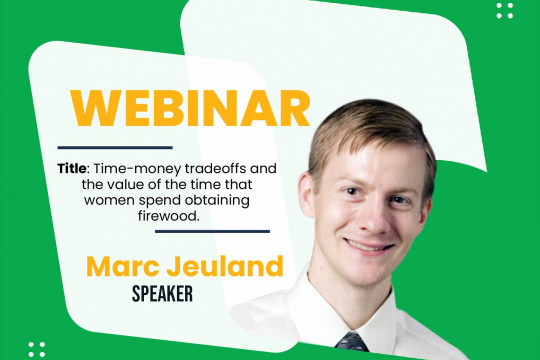Event Information
Contact
We are delighted to invite you to the inaugural EfD Webinar due on November 15, 2023, at 2 PM CEST.
This is a FREE webinar to be held over Zoom. We are honored to have Marc Jeuland a renowned environmental economist starting us off on this series.
Marc Jeuland is an applied environmental economist whose research interests include nonmarket valuation, water and sanitation, environmental health, energy and development, the planning and management of transboundary water resources, and the impacts and economics of climate change.
About the webinar:
Title: Time-money tradeoffs and the value of the time that women spend obtaining firewood
Abstract: Rural households across much of the world rely heavily on biomass, especially firewood, as their primary fuel for cooking, lighting, and heating, and women provide much of the household labor for gathering such fuel from the environment. Interventions aimed at reducing the amount of biomass needed, or transitioning households away from biomass entirely, have the potential to deliver substantial time savings in addition to their more frequently studied health and environmental benefits. Accurately estimating the value of the time (VOT) that households, and women in particular, might save from such an intervention is central to understanding its full social benefits, as well as the full social cost of traditional energy use. Unfortunately, there has been limited prior work to estimate this opportunity cost of time in fuel collection. We therefore analyze the time-money tradeoffs that rural households make in four African countries (Malawi, Zambia, Tanzania, and Kenya), when deciding how to obtain firewood. In using two nonmarket methods – stated and revealed preference – to estimate the VOT, we are able to explore how our results vary both across methods as well as across contexts. We find that households generally make logical tradeoffs between money and time, and the analysis also shows that several other factors, particularly socioeconomic status and the identity of the person collecting firewood, play an important role in the revealed preference choice patterns. Our estimates add important nuance to standard ‘rule of thumb’ guidance that suggests using 50% of the unskilled wage rate as a starting point for the VOT in cost-benefit analysis in low and middle-income settings.
Zoom link: https://gu-se.zoom.us/j/65835642029
We look forward to seeing you at the webinar.
Best regards,
EfD Global Hub
